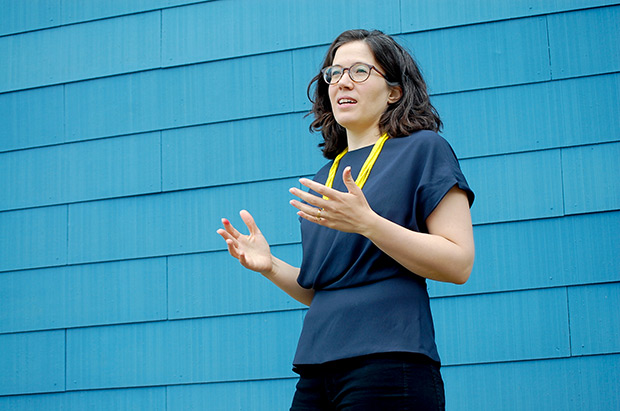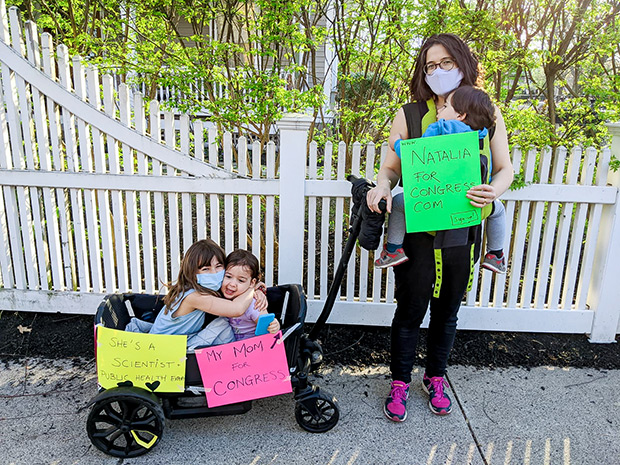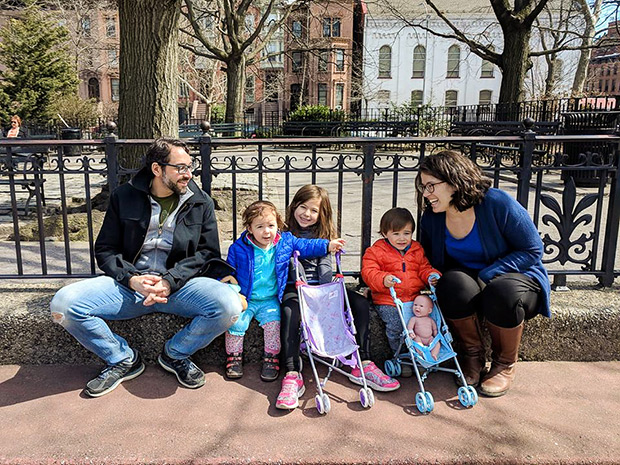Candidate for US Congress Natalia Linos: Her Campaign at the Corner of Science and Values
What does an epidemiologist and mother of three young children do in a time of a global pandemic and lockdown? Run for Congress, of course. Dr. Natalia Linos’ campaign for Congress, to represent Massachusetts’ Fourth Congressional district, is spurred by an absolute sense of urgency—”because our health can’t wait.” On September 1, 2020 her first hurdle is the Democratic primary, where she is running against several other candidates. The current Congressman, Joseph Kennedy III, is running for US Senate.

Natalia Linos
Beyond the immediate crisis staring us in the face, a host of systemic issues concern Dr. Linos. “There are only eleven scientists out of 535 legislators [in both Houses of Congress]. Congress has to be more diverse. It is too easy now to ignore a scientist whose research you don’t like. But if you’re in Congress and a scientist, you can’t be dismissed so easily.” Another number from a woman whose career is data-driven: “Only twenty-five members of Congress are women with school age children.” The lack of professional, gender, and ethnic diversity in Congress is a real issue.
Natalia is a Harvard trained scientist with a resume that includes work with the United Nations Development Program and the New York Department of Mental Health and Hygiene. She managed programs studying the intersection of health and climate change, and granular analyses of the impacts of structural poverty, inequality, racism and environmental injustice on individual neighborhood health. Numbers and data run her profession, yet her approach is very down-to-earth, pragmatic, and people oriented. “People are not a science experiment. [I am] someone with a science background who is not afraid to talk about values. There are links between climate change, poverty, governance, and representation—and human health.”

Natalia with kids campaigning-2
Natalia is a second-generation epidemiologist. Her mother and father are both doctors, graduates of the University of Athens who went on to the United States for their residency. Her father is of Smyrna and Maniote background; her mother from the Thessalian town of Karditsa. Natalia was born in Ohio but spent most of her school age years in Greece, where her epidemiologist mother had a university appointment. Hers was a religious and conservative while simultaneously progressive in terms of its global, technocratic outlook, and its strong belief in women’s empowerment.
Her value system was very much informed by this background, and she is adamant that while technocracy is important, values and context are also important. To put it in Greek terms, she combines techne (skill) with anthropia (incompletely translated as “humanity”). She has a wealth of experience to draw on, from living among the Kalash people of Pakistan (yes—those people who claim descent from Alexander the Great), to working with refugees in Greece, to hands on public health work within the United Nations and New York City. She is a great believer in global responses to global challenges. Back to the present crisis, Natalia reminds us that “if we don’t eradicate [COVID] everywhere, nobody will be safe.” In a world of constant travel and interconnectedness, it is impossible to have local solutions be effective.

Natalia and Family
I had to ask Natalia about Greece’s response to the initial phase of the COVID pandemic, led by Dr. Tsiodras, like Natalia a Harvard-trained scientist. She was of course pleased by Greece’s relative success, which she monitored daily with calls to her epidemiologist mother, as her parents live in Greece. She feels that key factors in Greece’s success were the Greeks’ “greater trust in science and public health” compared to the United States. For example, “the mistrust of vaccines here [in the US] is much less common in Greece.” Eyeing the current opening in Greece for tourism, she is worried about the possibility of an uptick. In Greece, as elsewhere public health concerns vie with economics for prioritization.
 I had to wonder if our lack of a national health system (like in Canada or Europe) might have been part of the reason that COVID infection rates were so high in the US. On this, Natalia’s response was measured and thoughtful. “It is hard to generalize a country’s success or failure based on the local health system,” she says, “but the huge number of uninsured or underinsured in the US was a problem. Even with insurance,” she adds, “you just don’t know what kind of a bill you are going to get. Here is the link—having to pay for health care is a major issue in the midst of a pandemic.” It is, further, an issue that is not isolatable to an individual or community, as the pandemic is a public health danger.
I had to wonder if our lack of a national health system (like in Canada or Europe) might have been part of the reason that COVID infection rates were so high in the US. On this, Natalia’s response was measured and thoughtful. “It is hard to generalize a country’s success or failure based on the local health system,” she says, “but the huge number of uninsured or underinsured in the US was a problem. Even with insurance,” she adds, “you just don’t know what kind of a bill you are going to get. Here is the link—having to pay for health care is a major issue in the midst of a pandemic.” It is, further, an issue that is not isolatable to an individual or community, as the pandemic is a public health danger.
This exchange prompted me to ask the question on whether the pandemic will change how healthcare is delivered including, perhaps, a “Medicare for All” option. Natalia offers that “seeing the country—and the economy—shut down, is a wake-up call. Our economy requires we have healthy people to operate.” People worrying about an insurance bill and not going to the doctor is bad for the economy. Perhaps seeing an entire country—the world in fact—shut down may alter people’s perceptions about Medicare for All which has been a hard sell politically in the US.
As we are both parents of school age children, and affiliated with universities, I had to ask Natalia about what the school year is going to look like. “I know the Greek Minister of Health,” she offers, “closing the schools early was an important move by the Greek government to stem the pandemic’s effect.” Students returning to crowded schools and universities is certainly an issue. Again, she goes to her statistics, “Data from Japan and Korea suggested that the age group 17-25 causes the virus to spread, because of the lifestyles of younger people and the likelihood that this age segment will not get really sick or will be asymptomatic.” College towns like Brookline where Natalia lives with her husband, Paul, and three children, Amalia, Leonidas, and Alexandra, will likely see an uptick in cases if there is a physical return to class in the Fall.
“Its hard to be a student these days,” Natalia says, “hard to be a graduate in this job market and hard to imagine being a freshman [possibly going to virtual school].” She believes that “for the next two to three years some of the social intimacy associated with the college experience will be curtailed severely.” In spite of this, she feels optimism in young people today, who she believes understand the linkages between issues—racism, poverty, climate change, health, gun safety—and she believes she can be part of effecting real change in society.
Natalia’s optimism is also expressed by her run for Congress, never any easy task. However, she has the requisite combination of knowledge and passion which—combined with the urgency of the times—may tip the scales. Crises such as pandemics are often transformative eras, and Linos’ message, one of science leavened with civics and ethics, might be just the medicine for the ills of the current era.











0 comments